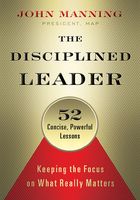

Eliminate the “Victim” Mentality
We have all worked around people—perhaps even bosses and other types of leaders—who’ve spent the majority of the time complaining about their job and all other aspects of life. You can spot these classic “victim” types from a mile away. They’re eternally angry, stressed, or mopey, often saying things like, “It’s not my fault,” “I can’t ever do this or that,” and “I don’t know how my life got this way.” These personalities are trapped in a cycle in which they can’t see their contribution to any of their difficulties. They drain positive energy out of the workplace because they’re always having some variation of a bad day. Moreover, positive people have to go out of their way to maneuver around these personalities because the negative energy can be so downright toxic.
If you want to be a well-respected leader, you can’t afford to act or think like a victim. This mindset and its associated behaviors are counter to the mindset and behaviors of strong, effective leaders. Also, good leaders attract people to them, while victims repel people away through the things that they believe, think, say, and do.
Some years ago, one of MAP’s construction industry clients was really struggling with a manager who was overseeing business for him in a major city. The manager had that classic “poor me” attitude when asked about missed goals and his failure to secure new bids. Finally, enough was enough. The CEO told this manager that he was the root of the problem and so it was he who needed to solve it—or else! As a result, the manager took action against his victim-like mentality, hired a sales director, and immediately started getting more work for the company.
It is a certainty we will all face difficult times and become victims of circumstance in some way or another. You just can’t escape it. But when you notice yourself in such situations, you can choose not to get caught in any eternal victimhood. You do this by controlling your attitude and how you consistently approach challenges big and small. Calling upon your strength and courage, you can fortify positive measures of self-discipline that will help you overcome obstacles and remain free from the grip of this vice. Here are some ideas how:
Retrain your brain. It’s okay to feel sorry for yourself once in a while. But it is more important to get power over your thoughts, swapping out negative feelings that don’t serve a good purpose with new, helpful ones that do. So if you find yourself thinking or speaking some version of, “It’s not my fault, I couldn’t help it,” note it. But then ask, “What can I do to control my situation?” or “In spite of how I feel, how can I act to get closer to my goal?” If you can get into a habit of recognizing and replacing those negative internal and external conversations with positive, productive ones, you will have a more fulfilling outlook on life and work and also attract people who will follow your lead.
Don’t get trapped. It is important to empathize with others who might be struggling at work or in their personal life. But you need to recognize when someone chronically chooses to play the role of victim. Watch out! You could get sucked into their complaining. Avoid taking on that individual’s mindset and self-defeating behaviors that will negatively affect you. It’s very likely you will sometimes have to deal with people like this in life and at work, perhaps listening to their problems or frustrations. But then make a mental commitment not to let their troublesome ways trap you or stifle your potential.
Replace helplessness with hope. There is a bit of “victim” ingrained in us all. To some degree or another, everyone struggles with feelings of helplessness at times. Fortunately we have choices about how to manage our emotions in such situations. As a leader, the emotions you choose to own and exhibit really need to be those that collectively reflect a strong spirit of hope no matter the difficulty of the situation and regardless of whether you truly are a victim of circumstance or not. Because the workplace culture often has a way of taking on the personality of its strongest leader, be aware that through consistent strength and optimistic, powerful messaging, you won’t just better yourself but will effectively impact others for the better, too. When people around you feel your optimism, they will also be encouraged to ward off thinking or behaving as victims.
In Summary: The Disciplined Leader knows how to attract followers through positive attitudes and beliefs. Being a victim repels people away through the things you believe, think, say, and do. Avoid playing the victim; display an optimistic leadership style.
Take Action!
 Jot down on paper some instances in which you felt like a victim. What resulted? How could you have handled those instances differently?
Jot down on paper some instances in which you felt like a victim. What resulted? How could you have handled those instances differently?
 Write down and memorize your philosophy for combating the victim mentality.
Write down and memorize your philosophy for combating the victim mentality.
 Limit exposure to people and conversations that might suck you into that victim mentality.
Limit exposure to people and conversations that might suck you into that victim mentality.